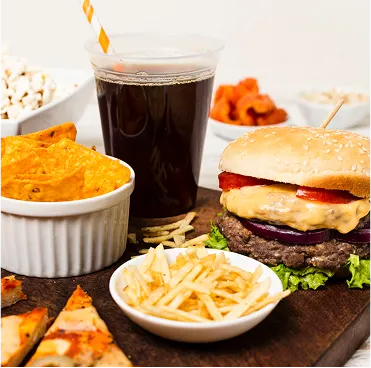Ever wondered why your knees ache a little more after a weekend of takeout, or why your joints feel stiffer after indulging in sweets?
You might blame age, stress, or a long day at work, but the real culprit could be your diet.
What we eat doesn’t just affect our weight or energy levels; it influences how our body feels from the inside out.
Some foods calm inflammation, keeping our joints flexible and healthy. But others can do quite the opposite. They act like fuel on a fire, worsening pain and stiffness.
Some of our daily favorites, comfort foods, sugary treats, or fried snacks can actually fuel inflammation and worsen joint discomfort over time.
So, if you’ve been waking up with stiffness or soreness that just won’t go away, it might be time to look at what’s on your plate.
Let’s uncover the major foods that can trigger inflammation and joint pain and what you can eat instead to keep your joints happy and healthy.
1. Sugary Treats
That tempting doughnut, fizzy cola, or sugary dessert may give you a quick energy rush, but your joints definitely won’t thank you later.
High sugar intake leads to the release of inflammatory chemicals called cytokines, which can trigger swelling and pain.
Sugar also causes a spike in blood glucose levels, which over time can contribute to advanced glycation end products (AGEs)—harmful compounds that damage tissues, including those in your joints.
Watch out for:
- Soft drinks and packaged fruit juices
- Pastries, cakes, and candies
- Sugary breakfast cereals
Betterchoices:
Try naturally sweet foods like fruits, dates, honey in moderation, or dark chocolate when the cravings hit. Your joints—and your overall health—will thank you.
2. Refined Carbs
White bread, white rice, and pasta may look harmless, but they can quickly convert into sugar inside your body.
These refined carbs have a high glycemic index, meaning they raise your blood sugar levels fast and increase inflammation markers.
Over time, this can worsen pain and stiffness in people with arthritis or chronic inflammation.
Watch out for:
- White flour-based foods (bread, muffins, pizza crusts)
- Instant noodles and pastries
- Processed breakfast foods
Betterchoices:
Switch to whole grains like oats, quinoa, brown rice, and whole wheat bread. They’re packed with fiber, which helps control inflammation naturally.
3. Red and Processed Meats
It’s hard to resist a juicy steak or spicy sausage, but red and processed meats can be major inflammation triggers.
They contain saturated fats and chemical preservatives like nitrates that promote inflammatory responses.
What’s worse, these meats also contain AGEs, which are formed when food is cooked at high temperatures. These compounds are known to worsen joint pain and stiffness.
Watch out for:
- Bacon, sausages, hot dogs
- Beef, lamb, and pork (in excess)
Betterchoices:
Opt for lean proteins like chicken, turkey, fish, tofu, and lentils. Fatty fish like salmon, sardines, and mackerel are especially great; they're loaded with omega-3 fatty acids that fight inflammation instead of fueling it.

4. Fried and Fast Foods
Those crispy fries and crunchy fried chicken might satisfy your taste buds, but they’re packed with trans fats, one of the worst offenders when it comes to inflammation.
Trans fats can increase “bad” cholesterol, block “good” cholesterol, and make your body’s natural inflammation-fighting processes less effective.
Regularly eating fried and fast foods can make you feel sluggish, bloated, and achy.
Watch out for:
- Deep-fried snacks (samosas, fries, chips)
- Burgers and fast-food meals
- Packaged baked goods
Betterchoices:
Try air-frying, baking, or grilling instead. Olive oil, avocado oil, or coconut oil can also help make your meals healthier.
5. Dairy Products
This tricky dairy affects everyone differently. Some people digest it fine, while others experience inflammation, bloating, or stiffness.
For people sensitive to dairy, the proteins casein and whey can irritate joint tissues and lead to discomfort.
Watch out for:
- Full-fat milk and cheese
- Cream and butter
- Icecream
Betterchoices:
Switch to plant-based milk like almond, oat, or soy milk. If you’re not sensitive to dairy, probiotic-rich options like yogurt to support gut health, which in turn helps control inflammation.
6. Alcohol
A little wine may be fine occasionally, but too much alcohol can worsen joint pain and stiffness.
It increases inflammation throughout the body and can also lead to uric acid buildup, which may cause gout a painful joint condition.
Alcohol also dehydrates your body, reducing the fluid in your joints that helps them move smoothly.
Watch out for:
- Beer (high in purines that lead to uric acid)
- Hard liquor and cocktails
Betterchoices:
Stay hydrated with water, herbal teas, or fresh coconut water. If you enjoy social drinking, limit your intake and opt for red wine in moderation for its antioxidant properties.
7. Processed and Packaged Foods
Anything that comes in a shiny wrapper and lasts months on the shelf likely contains preservatives, trans fats, and high sodium all linked to inflammation.
Processed foods can also disturb your gut microbiome, which plays a key role in managing inflammation levels in your body.
Watch out for:
- Chips, instant soups, frozen meals
- Packaged sauces and ready-to-eat snacks
Betterchoices:
Cook fresh meals with whole ingredients. Even simple home-cooked dishes with spices like turmeric, ginger, and garlic can naturally reduce inflammation.
8. Vegetable Oils High in Omega-6
Some vegetable oils like sunflower, corn, and soybean oils contain omega-6 fatty acids, which, in excess, can cause inflammation.
While your body needs omega-6 in small amounts, the problem arises when your diet is unbalanced, lacking omega-3 fatty acids that help counteract it.
Watch out for:
- Processed snacks fried in vegetable oils
- Salad dressings and mayonnaise
Better choices:
Use olive oil, flax seed oil, or canola oil, and include omega-3-rich foods like walnuts, chia seeds, and fatty fish.
Final Thoughts
Inflammation doesn’t just happen; it builds up silently, one meal at a time. The same way unhealthy food choices can worsen pain, mindful eating can help heal your joints.
You don’t have to give up everything you love. Just find balance. Eat colorful, whole foods that nourish your body and reduce inflammation naturally.
Because when you take care of your food, your food takes care of you. And your joint those quiet heroes carrying you through every step deserve that care.
Latest News & Blogs

The Role of Mental Health in Chronic Pain Recovery
Mental Health and Chronic Pain Recovery: Why Mind Matters

Debunking the Myths: Does ‘No Pain, No Gain’ Apply to Joint Injuries?
No Pain, No Gain: The Truth About Joint Injuries

Keeping Our Seniors Safe: Easy Home Safety Tips to Prevent Falls
Fall Prevention in Older Adults: Home Safety Tips



